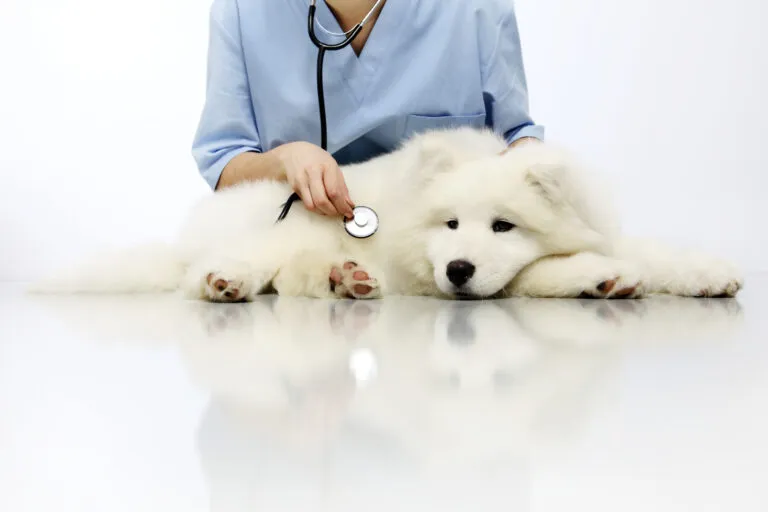Urinary Tract Infections (UTIs) in Dogs – Are you concerned that your dog may have a urinary tract infection (UTI)? Whether this is the first occurrence with a UTI or whether your dog has experienced them multiple times, you may have questions regarding symptoms, causes, and treatment options. In this blog, we will gain a complete understanding of Urinary Tract Infections (UTIs) in Dogs. 
What is a Urinary Tract Infection (UTI) in Dogs
A UTI or urinary tract infection, in dogs, is a bacterial infection that affects the bladder in some cases the infection can also affect the urinary system. This can cause discomfort and swelling as well as causing a variety of urinary symptoms in dogs.
Where And How Do Dogs Get UTIs?
In dogs, UTIs are mainly caused by a bacterial infection. The bacteria invade the urinary tract, primarily via the urethra, multiply, and this leads to infection and inflammation. Female dogs are more likely to develop UTIs because they have a shorter urethra, meaning bacteria have easier access. In most cases, dogs will have single episodes of a UTI that can be treated quickly before further investigative work is necessary. However, some conditions mean dogs may be more susceptible to repeated UTIs –
Urethral Sphincter Mechanism Incompetence (USMI) – This condition most frequently occurs in older female dogs, as USMI is the weakening of the small muscles that keep the urethra closed. Urinary incontinence can create a pathway for bacteria to return to the bladder.
Diabetes – Dogs with diabetes are particularly vulnerable to infections due to elevated sugar levels in their urine, which fosters an ideal environment for bacteria to thrive.
Congenital Issues – Some congenital issues, such as abnormal bladder positioning, predispose certain dogs to infections right from birth.
Tumors – Tumors in the urinary tract, whether related to cancer or inflammation, significantly raise the risk of infections.
Bladder Stones – Bladder stones require specific treatments and can lead to the development of urinary tract infections (UTIs).
Prostate Disease – Male dogs are not exempt from prostate disease can result in infections that typically require several weeks of antibiotic treatment to resolve.
Spinal Cord Issues – Additionally, spinal cord issues that cause weakness and incontinence make dogs more prone to infections.
What are the signs and symptoms of UTI in Dogs?
When a dog has a urinary tract infection, many signs may show its presence. These dog UTI symptoms include –
- Frequent urination
- Blood in the urine
- Straining to pass urine
- Passing small amounts of urine at a time
- Licking the genital area excessively
- Lethargy
- Changes in appetite or thirst
How are UTIs Diagnosed in Dogs
The vet will want to assess if there was a UTI by performing a urine analysis. Before going to your vet, consider collecting a sample of your dog’s urine to bring with you for them to perform a basic analysis. The vet can utilize a urine dipstick, which can tell the vet if there may be markers of infection, such as blood in the urine. It can also provide some information about urine glucose, whether a current issue could be diabetes.
In addition to dipstick analysis, assessing your pet’s urine concentration and performing microscopic analysis is important. Microscopy can identify crystals, bacteria, and the presence of red and white blood cells, which may indicate bladder stones or infection. Urine samples can also be sent to a lab for culture and sensitivity testing. This testing will allow the laboratory to grow the bacteria to determine what type of bacteria it is and which antibiotics would be the food treatment options for dogs.
The vet could also recommend other tests, such as X-rays or an ultrasound examination (if urinary issues happen on multiple occasions). At this time, a current issue can be evaluated for bladder stones, sample evaluation for prostate problems, assess tumors, or look for anatomical problems. Your vet may find it beneficial to also collect a more sterile urine sample in this method, as free catch samples collected at home can be contaminated by bacteria from the genitals or the dog’s environment.
Dog UTI Treatment
Veterinarians typically prescribe antibiotics from a pharmacy to treat a dog’s UTI. The antibiotic and length of treatment will depend on the severity of the UTI and any underlying cause. Veterinarians sometimes also prescribe anti-inflammatories to help with the pain and inflammation.
Dog UTI Home Remedies
Home remedies may help improve discomfort, but they should not replace veterinary care. If your dog has a UTI,//they need to be diagnosed by a veterinarian and receive an appropriate treatment plan. Home remedies to support urinary health in general include ensuring your dog maintains good hydration, offering a clean and safe environment, and practicing good hygiene…
How to Prevent Dog UTI
There are many ways to prevent your dog from developing a UTI. Improving hygiene (regularly bathing the genital region), ensuring fresh and clean water is accessible, encouraging regular urination/bathroom breaks, preventing long periods of urine holding, and regularly scheduled veterinarians’ visits will all help to prevent unnecessary UTI infections. Additionally, resolving other health issues that could cause an increased risk of UTIs, such as diabetes or anatomical malformations, should be addressed as well.
Conclusion
In conclusion, some urinary tract infections (UTIs) are simple, but not always. It is important that one of our vets examine your dog so they can help guide you on how best to proceed. Don’t forget you can either make an appointment with one of our wonderful vets at Pet Care Partners. Remember, if you are unsure if your pet should be seen, you can schedule a virtual vet visit with Pet Care Partners.
FAQs
Can a dog’s UTI cure itself?
Some minor UTIs can clear on their own. But, the best course of action is to see a vet to rule out a diagnosis and treatment to avoid complications.
Why does my dog keep getting UTIs?
Your dog may have recurrent UTIs for various reasons, like anatomical reasons, weakened sphincter, stones in the bladder (also have possible answers), and other health issues. A vet is the best for diagnosis.
Can a UTI kill a dog?
A UTI can become severe with complications from a kidney infection and/or sepsis when untreated (and possibly life-threatening). Getting to your vet is very important.
How to know that a dog has a UTI?
Signs of a dog UTI include often urination, blood in the urine, straining during urination, passing small amounts of urine, excessive licking of the genital area, lethargy, and changes in appetite or thirst.




